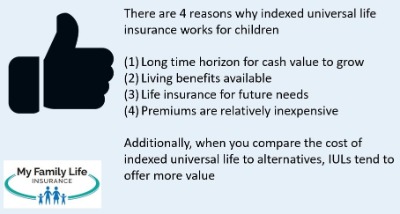All Categories
Featured
Table of Contents
1), commonly in an effort to defeat their group averages. This is a straw guy disagreement, and one IUL folks like to make. Do they compare the IUL to something like the Lead Total Amount Stock Exchange Fund Admiral Shares with no tons, an expenditure ratio (EMERGENCY ROOM) of 5 basis points, a turn over ratio of 4.3%, and a remarkable tax-efficient document of distributions? No, they compare it to some dreadful proactively handled fund with an 8% lots, a 2% EMERGENCY ROOM, an 80% turnover proportion, and an awful record of short-term funding gain distributions.
Shared funds commonly make yearly taxable circulations to fund proprietors, also when the value of their fund has gone down in value. Common funds not only call for income reporting (and the resulting annual tax) when the common fund is going up in worth, however can likewise enforce revenue taxes in a year when the fund has dropped in worth.
That's not just how common funds work. You can tax-manage the fund, gathering losses and gains in order to reduce taxed circulations to the investors, however that isn't somehow mosting likely to transform the reported return of the fund. Only Bernie Madoff types can do that. IULs avoid myriad tax obligation catches. The possession of common funds may call for the common fund owner to pay estimated tax obligations.

IULs are easy to place to ensure that, at the proprietor's death, the recipient is not subject to either earnings or estate tax obligations. The exact same tax decrease strategies do not function almost also with shared funds. There are many, usually costly, tax obligation traps associated with the moment trading of common fund shares, traps that do not relate to indexed life Insurance policy.
Possibilities aren't really high that you're going to undergo the AMT due to your common fund distributions if you aren't without them. The remainder of this one is half-truths at best. While it is true that there is no earnings tax obligation due to your heirs when they acquire the proceeds of your IUL policy, it is additionally true that there is no earnings tax due to your heirs when they inherit a mutual fund in a taxed account from you.
Veterans Universal Life Insurance
There are better methods to avoid estate tax issues than acquiring investments with low returns. Mutual funds may create income taxes of Social Safety and security benefits.

The development within the IUL is tax-deferred and may be taken as tax complimentary revenue by means of financings. The plan proprietor (vs. the shared fund manager) is in control of his or her reportable revenue, therefore allowing them to reduce or perhaps remove the tax of their Social Safety benefits. This set is wonderful.
Right here's another minimal issue. It's true if you get a mutual fund for claim $10 per share prior to the distribution date, and it distributes a $0.50 circulation, you are after that mosting likely to owe tax obligations (probably 7-10 cents per share) although that you have not yet had any kind of gains.
However ultimately, it's truly about the after-tax return, not just how much you pay in taxes. You are mosting likely to pay more in tax obligations by utilizing a taxed account than if you buy life insurance policy. Yet you're also possibly going to have more cash after paying those tax obligations. The record-keeping requirements for having mutual funds are significantly a lot more complicated.
With an IUL, one's records are kept by the insurance provider, duplicates of yearly declarations are sent by mail to the owner, and distributions (if any kind of) are totaled and reported at year end. This is additionally kind of silly. Certainly you must maintain your tax documents in instance of an audit.
Using Iul For Retirement
Barely a factor to get life insurance. Shared funds are generally part of a decedent's probated estate.
In enhancement, they undergo the hold-ups and expenses of probate. The profits of the IUL plan, on the various other hand, is constantly a non-probate circulation that passes beyond probate straight to one's called recipients, and is therefore not subject to one's posthumous creditors, unwanted public disclosure, or similar delays and costs.
Medicaid incompetency and lifetime income. An IUL can give their owners with a stream of earnings for their whole lifetime, no matter of just how long they live.

This is helpful when organizing one's events, and converting assets to revenue before an assisted living facility arrest. Shared funds can not be converted in a similar way, and are often considered countable Medicaid assets. This is an additional dumb one supporting that inadequate people (you recognize, the ones who require Medicaid, a government program for the poor, to spend for their nursing home) should make use of IUL as opposed to mutual funds.
Indexed Universal Life Pros And Cons
And life insurance coverage looks dreadful when compared rather against a retired life account. Second, individuals that have cash to buy IUL above and past their pension are going to need to be awful at handling cash in order to ever receive Medicaid to pay for their assisted living facility expenses.
Chronic and terminal ailment rider. All policies will certainly permit a proprietor's easy accessibility to money from their plan, usually waiving any kind of surrender penalties when such people experience a major health problem, need at-home treatment, or become restricted to an assisted living facility. Common funds do not provide a comparable waiver when contingent deferred sales costs still put on a mutual fund account whose owner requires to offer some shares to money the expenses of such a remain.
Indexed Universal Life Insurance Versus Life Insurance Policy
Yet you obtain to pay more for that advantage (cyclist) with an insurance coverage. What a lot! Indexed global life insurance policy offers survivor benefit to the beneficiaries of the IUL proprietors, and neither the proprietor nor the beneficiary can ever lose money as a result of a down market. Mutual funds supply no such assurances or survivor benefit of any type of kind.
I absolutely do not require one after I get to financial freedom. Do I desire one? On average, a purchaser of life insurance coverage pays for the real price of the life insurance policy advantage, plus the expenses of the policy, plus the revenues of the insurance policy company.
Equity Indexed Whole Life Policy
I'm not entirely certain why Mr. Morais included the entire "you can't shed money" once again below as it was covered quite well in # 1. He simply desired to duplicate the most effective marketing factor for these points I expect. Once again, you don't shed small bucks, yet you can shed genuine bucks, as well as face serious possibility price as a result of low returns.

An indexed universal life insurance policy policy owner might exchange their policy for a totally various policy without triggering earnings taxes. A mutual fund owner can stagnate funds from one mutual fund business to an additional without offering his shares at the previous (therefore setting off a taxable event), and buying new shares at the latter, usually based on sales costs at both.
While it holds true that you can exchange one insurance coverage plan for an additional, the reason that people do this is that the first one is such a dreadful policy that even after getting a brand-new one and experiencing the very early, negative return years, you'll still appear in advance. If they were sold the right policy the first time, they should not have any kind of desire to ever trade it and experience the early, negative return years once again.
Latest Posts
Universal Index Life Insurance Pros And Cons
Adjustable Life Insurance Vs Universal Life Insurance
Universal Premium Acceptance Corporation